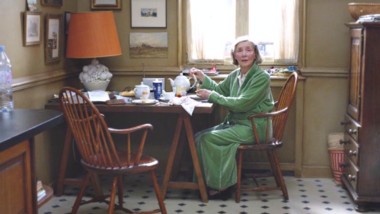Not long after the Academy Award nominees were announced last month, some Internet wag opened a copy of Photoshop and got busy on a batch of fake movie posters. The result—circulated under titles like “Honest Oscars” and “More Accurate Movie Posters”—used the films’ real poster art but invented titles that cut aby piercing the pompousness of many an Oscar campaign.
Les Miserables became Crying & Fighting: The Musical (subtitle: French People, Cockney Accents); Quentin Tarantino’s violent slave-era film Django Unchained morphed into Inglourious Basterds: Slavery Edition. Beasts of the Southern Wild, sadly, was The One That Probably Should Win But Won’t. But for anyone who counts himself a fan of foreign film, there was one that proved irresistible—Michael Haneke’s film Amour, which has already won the Palm d’Or at the Cannes film festival and is up this Oscar season for Best Picture, Best Actress and Best Director. It’s a masterpiece, touching and tender and heartbreaking, but to the Internet, it could be summed up in one word. Where the original poster had Amour, its gag counterpart had one word: French.
It’s ridiculous, of course, but like the best comedy, it has more than a grain of truth. And the truth is that there is, in French cinema, a willingness to tell more grown-up stories of love and loss than many American studios are open to exploring. Haneke’s film, screening this week at Amherst Cinema, does it brilliantly.
The story of Amour is the relationship of Georges and Anne, two elderly Parisians whose familiar lifestyle is shaken when Anne falls ill. Both former music teachers, the couple have settled into a rhythm of their own as longtime lovers who have come to rely on each other more than they realize, sharing everything from simple breakfasts to evenings out at concerts by former students. And then one morning, without notice, things change. Anne cannot speak.
From there, their life begins a terrible tumble. A seemingly common surgery goes awry, leaving Anne partially paralyzed and confined to a wheelchair. Although she would likely get better care in a nursing home, Georges promises her that she won’t have to leave their home—a vow that ultimately proves both the best and worst thing for both of them. When he can’t handle Anne’s care on his own, Georges is forced to hire a nurse, who mistreats Anne. Their adult daughter (Isabelle Huppert), a self-centered musician, is either too selfish or too embarrassed by her mother’s condition to be any help. Instead, she floats on the outskirts of her parents’ love, a stranger to their closeness.
While some of the steps shock, the end is never in question, and Haneke does a remarkable job of getting us there. The director is better known for a long line of hard-hitting, emotionally devastating films like The Piano Teacher and FunnyGames—films that are often hard to watch, but in a different way. Those films are difficult because of how they make us feel about others; Amour, because of how it makes us feel about ourselves.
*
Also this week: YouthFilm 2013 comes to the Academy of Music in Northampton on Saturday. Featuring films made by and starring Pioneer Valley youth, the day-long festival will give many their first taste of the big screen (but likely not their last). The screenings start at noon with family-friendly fare; more mature films screen later in the day. Tickets are just $3 (cash only), but anyone 16 or younger gets in free.•
Jack Brown can be reached at cinemadope@gmail.com.



